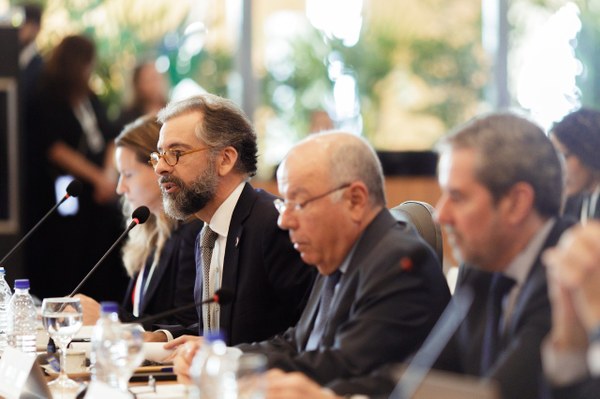BRICS Negotiators To Meet From Today (June 30) in Rio de Janeiro (RJ)
Ahead of the Leaders’ Summit, the bloc’s political negotiators are gathering in order to align their commitments on combating socially determined diseases, on artificial intelligence governance, and on climate finance. The focus is on concrete solutions to the structural challenges faced by the Global South

In the final lead-up to the Leaders’ Summit, set for July 6 and 7 in Rio de Janeiro, the sherpas—political negotiators from BRICS member States—are reconvening today, June 30, in the State capital. The meetings, expected to run through July 4, will lay the groundwork for the discussions that will shape next week’s summit of heads of State and government.
This third gathering will focus on health, artificial intelligence, and climate change. Chairing the meeting as Brasil’s sherpa is Ambassador Mauricio Lyrio who, having also served as sherpa during Brasil’s presidency of the G20 last year, brings extensive experience to the role. On the topic of climate change, Lyrio holds the prominent position of Secretary for Climate, Energy and Environment at the Ministry of Foreign Affairs (MRE) – a position previously held by Ambassador André Corrêa do Lago, now President of COP30.
“Through international cooperation, diplomacy facilitates access to resources and technologies—such as vaccines within BRICS— and brings tangible benefits to people’s lives. Artificial intelligence can also serve as an ally in tackling challenges like climate change and improving health, and Brazil’s foreign policy is committed to producing concrete, real-world results,” the sherpa said in an exclusive interview with BRICS Brasil at the outset of the meeting. Lyrio also emphasized the commitment of Brasil’s foreign policy to make negotiations more result-driven.
Priority Topics
HEALTH — Earlier this month, BRICS health ministers released a final declaration calling for the creation of a Partnership to Eliminate Socially Determined Diseases. Beyond expanding vaccine cooperation, the document positions the alliance among Global South nations as a driver of integrated, cross-sectoral action. According to the ministers, international commitment will be key to accelerating “the path toward global health equity.” According to the World Health Organization (WHO), social determinants of health include people’s circumstances at birth, the conditions in which they grow, live and work, and age. Factors such as hunger, poverty, and inadequate housing directly shape public health outcomes.
ARTIFICIAL INTELLIGENCE — Under Brasil’s presidency, the group is working to build international governance that ensures artificial intelligence is used ethically and directed toward solving global problems such as poverty, educational gaps, climate change, and diseases. Last week, BRICS ministers of Science, Technology and Innovation (STI) signed a final declaration reinforcing the importance of expanding access to and control over technologies and innovations by countries of the Global South — traditionally concentrated in the Global North. The document also outlines expanded cooperation among members to develop more accessible technological languages and build infrastructure that allows exploration of new tools, including artificial intelligence (AI).
CLIMATE CHANGE — At the end of last month, high-level BRICS representatives signed an ambitious new commitment. The document lays out different paths for implementing climate action in Global South countries. “For the first time, we will have a document that provides a roadmap for joint BRICS action on climate finance. It touches, for instance, on reforming multilateral banks, achieving greater concessional financing, mobilizing private capital, and other regulatory measures to ensure that financial flows reach developing countries,” explained Ambassador Tatiana Rosito, Secretary for International Affairs at the Ministry of Finance.
Environment ministers also adopted a final declaration reaffirming the importance of “environmental multilateralism” and of fostering “balanced and inclusive global governance” in order to achieve shared goals in the protection of flora and fauna.
Previous Meetings
The first Sherpa Meeting, held in February at the Itamaraty Palace in Brasilia (DF), was marked by the unanimous approval of key topics proposed by Brasil. One of the highlights was the review of the Strategic Partnership in the Economic Area, a five-year plan now being renewed under Brasil’s leadership. President Luiz Inácio Lula da Silva attended the session and emphasized the importance of multilateralism in building a more balanced global agenda.
The second meeting, held in April in Rio de Janeiro (RJ), stood out for the unprecedented participation of civil society that characterized it. A joint session between sherpas and leaders from the BRICS “People-to-People” (P2P) pillar represented a significant shift in how the group incorporates social demands into its decision-making process. It resulted in key points of consensus, such as the need for the New Development Bank (NDB) to act as the main financing agent for industrialization in the Global South.